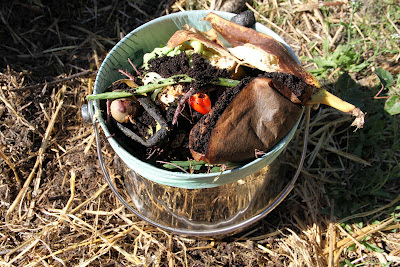by Laura Emerson, an Alaskan Master Gardener
The following is written particularly for those who don’t have a compost for their gardens or if you have a tiny yard or just a patio or balcony with plants on it.
Take NOTE; Take HEART: Even without composting, there are many ways that your flowers and vegetables can benefit from much of the garbage your kitchen accumulates (see alphabetical list below). (I invite other master gardeners to add to this posting).
Free. Available. Non-toxic. Gets rid of garbage. What’s not to like?
Give some of these a try and let me know how they work for you. I
always use the banana, coffee, egg shell, and wood ash hints, and less
often the others.
 |
| Way too good to waste by throwing in the garbage. This bucket of coffee grounds, banana peels, and what not is destined for the garden! Photo by Heidi Rader. |
Banana peels: These peels decompose quickly and deliver 41% potash and 3% phosphorus to the plants around which they are buried. Roses particularly benefit. Chop the peels into little pieces and poke a few (2-3) into the ground around the roots. How easy is that! If you wish, you can freeze the peels in order to accumulate enough for a one time spring project.
Beer: (is there any left over?) or sugar water in dishes on the ground will attract slugs which will climb in and drown.
Coffee grounds: Coffee grounds contain 2% nitrogen. Mix into the soil or pour around your plants. The latter method has the advantage of deterring snails, slugs, and possibly caterpillars, but it doesn’t get down to the roots as fast.
Egg shells: Because egg shells are 93% calcium, they are useful when more of that mineral is desired. The more you grind/pulverize the egg shells, the better they can release the mineral. Scatter ground shells around plants susceptible to a calcium deficiency that causes blossom rot (like squash or tomatoes). Put them near your bird feeder to give extra calcium to birds you want to lay eggs nearby. (You can do so with chickens, too, but grind them up so they don’t start eating their own eggs, if you want them). Grind the shells and scatter them around plants to deter slugs and worms from crossing the sharp texture to get to that tasty stem. This has worked very well for me, and in obvious contrast to those I haven’t encircled.
Milk: Spray full strength on plants suffering from mildew or mold.
Onions: Make a spray to kill red spiders and aphids. Make a 1:1 ratio of chopped up onions and water. Blend in a blender. Perhaps add a bit of liquid soap (to stick to the plants better). Strain. Bury the solid mash in the garden near the affected plants. Pour the liquid into a hand sprayer and spray, particularly where the bugs are, usually, the underside of leaves). Onions and chives (growing or leftovers) deter rabbits and mice in the garden. I purposely plant chives around my strawberry and broccoli/cabbage/cauliflower gardens for this reason.
Orange peels: Orange peels contain d-Limonene which destroys the waxy coating on ants and aphids, causing them to suffocate and die. Scatter or bury next to affected plants. Orange peel rubbed on your skin can supposedly deter mosquitoes.
Packaging pellets: These annoying products can be a useful base, below soil, for hanging or potted plants. They help with aeration and watering. (also true for chopped up paper products, like cardboard and newspaper, which decompose, which the plastic pellets don’t)
Peppers: Make a 1:1 ratio of dry, chopped, hot pepper pods and water. Add a little liquid or powdered soap (to stick to plants). Blend in a blender. Pour into a spray bottle. Spray on any of the following: ants, spiders, undesired caterpillars, tomato worms and cabbage worms. Even simpler, dry cayenne or hot pepper dusted onto plants deters caterpillars and rabbits. I love this. Doesn’t everyone have cayenne that is just aging in the kitchen?
Sugar: Dry sugar sprinkled in a garden kills nematodes (tiny parasites that kill roots) in 24 hours. 3 TBS sugar and 2 TBS vinegar in a large vase (quart) will preserve cut flowers longer.
Tea bags: You may have heard in the past that tea bags are good for the garden. Well, loose tea is good but about according to the UK Guardian, 40% of commercial teabags are made of polypropylene, which isn’t.
Wood ash: Ash reduce acidity in soil and reduce blossom rot on tomatoes. They also may deter rabbits. Spray an ash/water mix on trees afflicted with wood borers.
Note: my very favorite gardening book is Carrots Love Tomatoes and Roses Love Garlic by Louise Riotte. It offers many wonderful companion planting ideas, as the title indicates, but also helpful hints on a broader range of gardening topics. This was where I first heard of the banana peel trick. Some of the other hints come from other sources I’ve long since forgotten.
Other Resources:
The Compost Heap in Alaska
Make your Own Fertilizer
.
About Heidi Rader
Twitter •